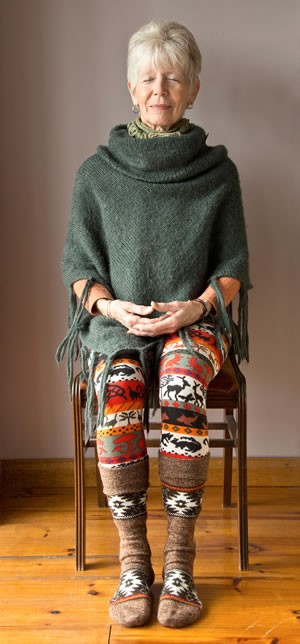The Benefits of Meditation
Stress relief also aids memory and it’s like pressing the reset button on your computer.

Kay MacDuffee, 80, of Caledon has been taking time to meditate twice a day for about 15 years. The former kindergarten teacher, who still supply teaches a few days a week, says, “Meditation changes my day for the better, and changes who I am. I don’t get distracted as much by the daily minutiae.” Photo by Pete Paterson.
If you were to ask me, I’d say we live in a part of the world with three seasons: winter, summer and Christmas. Each season lasts about four months, and winter starts in January. Because I have no grandchildren to spoil, the Christmas season is my least favourite.
So last September, with Christmas decorations sprouting, the refugee heartbreak in Europe sharing headlines with almost daily violence in Toronto and the federal election campaign at full throttle, my mood was indeed sombre.
Someone once said, “A greater tomorrow requires action today.” Time to take control, or my sombre mood could turn into a black pit. My yoga instructor Jean Szmidt had been offering meditation classes. Hmm. I booked an appointment.
According to Jean, the mechanics of meditation are as follows. Turn off anything that might become a distraction (cellphone, computer alert, radio). The lotus position is the classic posture: sit on a cushion on the floor with legs crossed, back straight and hands resting upward on your knees. But if your knees or hips protest, you can also opt to sit in a comfortable chair, feet flat on the floor and back and neck straight. Adjust cushions so your lower back is supported. Place your left hand in your lap, palm up, the right on top, thumbs meeting.
Set a timer with a pleasant ringtone. The time can vary from two to 20 minutes for first efforts. Gently close your mouth and eyes, and begin to concentrate on your breathing.
Centre your attention on the entrance to your nostrils, just above your upper lip. As you settle in, you will likely find your breathing becomes slower, and you might notice a slight pause between each inhalation and exhalation. Your total awareness should be on the air entering and exiting your nostrils.
When your thoughts wander, gently bring them back into focus. In, out, in, out. It may help to silently repeat a focus phrase such as “ohm,” the traditional mantra, or anything else you are comfortable with – perhaps “my mind (on the inhalation) is calm” (on the exhalation). Notice what you’re thinking and feeling, but gently set it aside and pay full attention to your breathing.
The goal is to become grounded in the moment.
“You can’t mess up meditation,” says Jean. “Those nattering thoughts can be good. They give you an opportunity to practise the important skill of bringing yourself back to the now, without judgement. Think of it as inner housekeeping, an exercise for connecting to your inner being.”
A cancer survivor, Jean says practising meditation has made her more grounded. She likens it to pushing the reset button on her computer; it clears her emotional pathways of stress and enables her to let go of negative influences. She says the practice leaves her softer and lighter.
No longer is the discussion of meditation to be found only in obscure self-help books and ashrams. It is quickly becoming society’s go-to antidote to stress. The practice of meditation is being integrated into some school curriculums, our healthcare systems, businesses and even professional sport teams.
Various studies have suggested that regular meditation may produce physical changes in the brain. These changes improve brain function, including the ability to retrieve both long- and short-term memories. For aging adults, this means the brain is better able to store new and old memories. And who among us doesn’t need some degree of memory improvement?
In Orangeville, the Kadampa Meditation Centre sponsors a weekly evening session focusing on Buddhist wisdom and meditation techniques. Under the inspirational guidance of Rose Hirano, the classes are designed to reduce the negative thinking that can often creep up on us as we age.
Incorporating meditation into daily routines also helps develop clarity and perspective, and improves focus and sleep patterns while creating greater inner peace and balance.
I’m a novice at all this, but I see meditation as a journey toward the present moment. I am training myself to become conscious only of the now, without thoughts of tomorrow, which will take its own shape, or of yesterday, which I can learn from but not change.
This makes perfect sense to me. Shouldn’t we be living and appreciating the time we have left of life in the here and now?
And I promise myself that next year I will not get emotionally involved with Christmas marketing in September. And if ohm helps that process, ohm going to stick with it.








